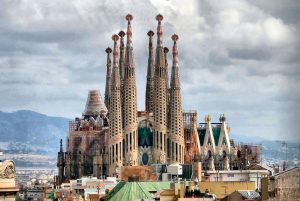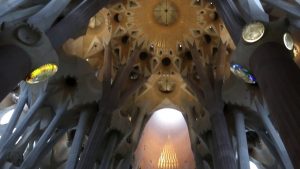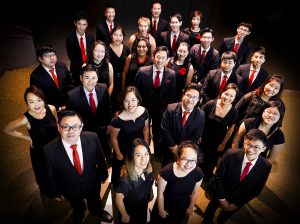Circle Concerts And Other New Features Of The Barcelona Symposium
The Barcelona Symposium has a range of features that make it stand out from the other symposia held so far. Barcelona, capital of the Mediterranean, next to the sea and with an important historical legacy, will fully embrace the symposium’s activities. The choirs selected to take part will not just perform for those who registered for the symposium, but for all lovers of choral music; they will give public concerts in various public spaces in Barcelona and the surrounding areas.
But that’s not all. The Barcelona Symposium has introduced a new way to participate, opening its doors to choirs from around the world, including choirs that were not selected to take part in the symposium and choirs that are interested in playing an active part in the conference programme and giving concerts. These choirs will also get to experience the musical atmosphere of the symposium for a few days and will give concerts within the framework of the special CIRCLE CONCERTS programme, included as part of the symposium and the 52nd International Festival of Choral Music in Barcelona.
We wish to organise as many concerts and activities related to choral music as possible during the symposium, and to make Barcelona and Catalonia a centre for cultural exchange with participants from around the globe.

List of choirs taking part in the CIRCLE CONCERTS programme:
- Kulkuset Mixed Choir, Finland
- University of Oregon Chamber Choir, USA
- Grupo Vocal Aequalis, Argentina
- VIVA! Youth Singers of Toronto, Canada
- Chromas, Turkey
- I Muvrini, Corsica
- The Eight Second Choir of Zhejiang Conservatory of Music, China
- Raffles Singers, Singapore
- Shangai Youth Choir, China
- Ellerhein Girls’ Choir of the Tallinn Centre for Extracurricular Activities Kullo, Estonia
- Jyväskylän Naislaulajat, Finland
- “Ozarenie” Chamber Choir of the Moscow Musical Society, Russia
- The North Coast Chorale, USA.
- Ponomaryov Children’s Choir VESNA, Russia
- Coro de Jóvenes de Madrid, Spain
- Coro de Adicora, Argentina.
SPECIAL CONCERT IN THE SAGRADA FAMILIA AND MORE…
On 26 July, a very special concert will take place in the basilica of the Sagrada Familia in which all symposium participants will be able to take part. This cathedral, a well-known emblem of the city of Barcelona, has already hosted a number of extraordinary choral concerts in recent years, including a concert on the day of the consecration of the basilica in the presence of Pope Benedict XVI, for which we organised a choir of 500 singers. Hosting the global symposium in Barcelona is, without question, a unique occasion, and the Sagrada Familia is the perfect venue for the global choral community to come together. All participants will have the chance to share the extraordinary experience of a concert in this imposing cathedral and marvel at Antoni Gaudí’s design. Some of Catalonia’s finest choirs are preparing a carefully chosen programme for the concert, which will trace the sacred choral music of the region through the centuries. Starting with Gregorian chant, we will then hear works based on the devotional texts of the Llibre Vermell de Montserrat, as well as works from Catalan composers including Joan Cererols (1618-1680), Francesc Valls (1671-1747), Narcís Casanoves (1747-1799), Ferran Sors (1778-1839), Pau Casals (1876-1973) and Josep Vila (1966-), before finishing with two contemporary works composed especially for the Sagrada Familia by Bernat Vivancos (1973-) and Raimon Romaní (1974-).

The opening and closing concerts will also be special occasions, full of surprises that will be revealed one by one. They will be held in the magnificent Sala Pau Casals del Auditori in Barcelona, a concert hall with superb acoustics that will host the majority of the official symposium concerts. However, it is impossible to think of choral music in Barcelona without considering the city’s most iconic venue: the Palau de la Música Catalana. This building, an icon of Catalan modernism, is home to the Orfeó Catalá and is one of the most world’s most important, dynamic and renowned centres for choral music. Located in the centre of the city, it was designed by Lluís Domènech i Montaner, and some of the most important master builders of Catalan modernism were involved in its construction. Declared a UNESCO World Heritage Site 20 years ago, the building is a homage to music and the proud historical traditions of Catalan music in particular. This splendid venue will host two of the official symposium concerts.
During the evening, , there will be concerts performed simultaneously by the invited choirs in various different parts of the city: in the heart of the Gothic Quarter, in the churches of Santa Maria del Pi, Sant Felip Neri and Sant Pere de les Puelles (the latter is one of the oldest in the city); in the Santa Maria de Gracia, located in the heart of one of the most picturesque of Barcelona’s districts; in the Auditori Caixa Forum at the foot of the Montjuïc hill, an auditorium located in the modernist surroundings of the old Casaramona textile factory, designed by renowned Catalan architect Puig i Cadalfach between 1919 and 1912 and now one of the city’s most dynamic cultural hubs; and in the Auditori del Conservatori del Liceu, located in the Raval district right by the historic city centre, where there is a new building housing the Conservatorio Superior de Música del Liceu. This auditorium is located on a prestigious thoroughfare linking the Rambla with the Avenida del Parallel, famous for its theatres.

NEW FEATURES OF THE SYMPOSIUM PROGRAMME
In addition to the conferences, masterclasses, concerts, communal singing, new compositions and everything else we have already described, in a few days’ time, we will post details on our website of the wide-ranging programme of presentations, of which there will be around 50. The presentations will be 45 minutes long and will be divided into the following subject areas: Choral Heritage, Publishers, Composers, Institutions and Activities.
XIOMARA A. VILLA was born in Colombia in 1991 and moved to Barcelona to attend university studies. Graduated in Political Science and Master in International Relations from the Autonomous University of Barcelona, she has been interested in conflict analysis, peace building processes and the impact that music has on these phenomena. Connected to the world of music since childhood, she has received training in vocal technique and violin and sings regularly in choral groups. She recently joined the FCEC in support of the organization for the World Symposium on Choral Music. Email: xiomarawscm11@fcec.cat
BARBARA ANGLÍ has been the executive secretary of the Catalonia Federation of Choral Entities (FCEC) for 32 years. She coordinates activities, which are organised by the FCEC, does administrative and communicative tasks and builds relationships with fellow organisations. She forms part of the committee organising the International Festival of Choral Singing in Barcelona – that, this year, has celebrated its 51st anniversary – and she is the person responsible for administration, in the committee for the WSCM11 that will be celebrated in Barcelona in July. Email: wscm11@fcec.cat
Translated by Christopher Lutton, UK
Edited by Kelly Harrison, USA
